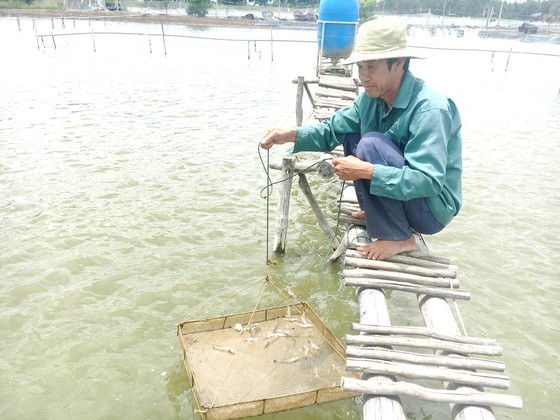 Society
Society


|
| A shrimp breeding pond in HCM City’s Cần Giờ District. — Photo www.sggp.org.vn |
HCM CITY — Occupational training will be provided to more than 6,400 labourers in HCM City's rural areas this year, with the aim of having at least 85 per cent of them receive new jobs.
Providing vocational training for rural workers to adapt to the Fourth Industrial Revolution (Industry 4.0) era is among the top concerns of city leaders.
Rural labourers in Cần Giờ District, for example, have taken vocational training courses mostly in tourism services and technology applications in agricultural production such as the breeding of shrimp, dứa fish and crabs.
Phạm Quang Chiến, deputy head of the district’s Department of Labour, Invalids and Social Affairs, said that many localities were focusing on expanding the high-tech shrimp farming model.
Thanks to new technologies, shrimp farmers in the district have been able to breed 100 shrimp per square metre and harvest more than 20 tonnes of shrimp per hectare after four months of breeding, earning double the amount from traditional practices.
The profit is an average of nearly VNĐ1.5 billion (US$64,600) per ha per crop.
However, only 42 of 1,171 households are taking part in the high-tech shrimp farming model.
“Local farmers often lack knowledge and experience to take part in high-tech shrimp breeding,” Chiến said.
The district has collaborated with vocational training facilities to open many training courses in new techniques and advanced technologies in shrimp farming, he said.
Nguyễn Vũ Thụy Hồng Loan from the HCM City Agricultural Technical Intermediate School said that qualified vocational teachers played an important role in vocational training and education.
“Both theoretical training and practical experience are necessary in vocational training,” she said.
Từ Minh Thiện, deputy head of the HCM City Agricultural Hi-Tech Park management board, said that State management agencies should keep abreast of market trends and provide information to local people.
Based on demand, local residents can then choose the most suitable products for production and learn necessary skills, he added.
Nguyễn Văn Lâm, deputy director of the city’s Department of Labour, Invalids and Social Affairs, said the city in the last 10 years has provided vocational training to 717,000 rural labourers.
Of the figure, there are 874,700 people, or around 85 per cent, who have received jobs after training.
To meet the requirements of Industry 4.0, vocational training has made serious changes in teaching programmes and advanced techniques, and training methods and models.
“Vocational training for rural labourers, however, has not yet met the requirements of industrialisation and modernisation,” Lâm said.
Many young people in rural areas have given up agricultural work to work in industrial parks or as guest workers abroad, he said, adding that most of them are not interested in agricultural courses. — VNS




